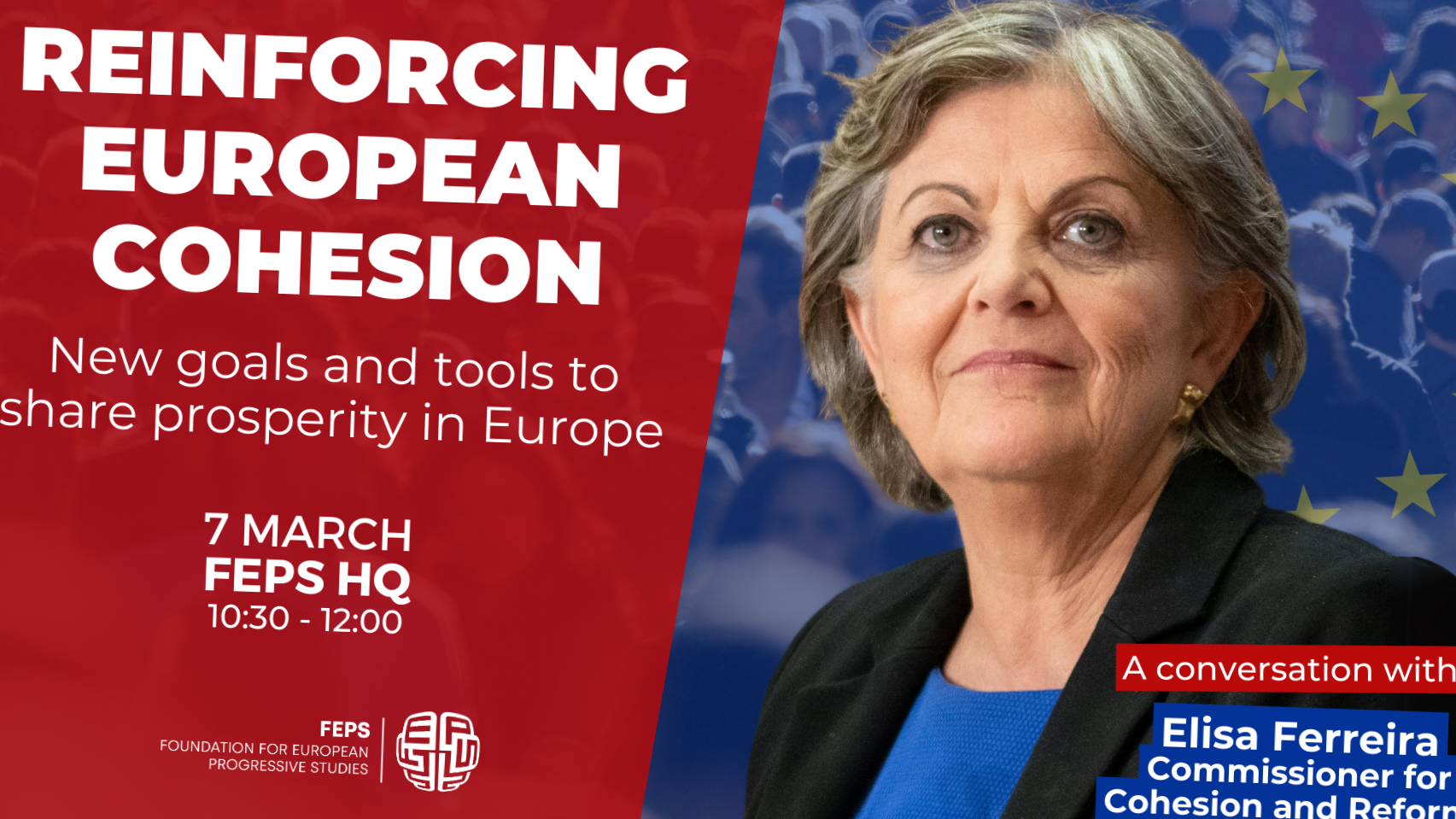(7 March 2024, FEPS)
Together with EU Commissioner Elisa Ferreira and a panel of policy-making experts, the discussion organised by FEPS (Foundation for European Progressive Studies) elaborated on the added value and performance of the Cohesion Policy and tried to anticipate some of the difficult debates on the next Multiannual Financial Framework (MFF).
Speakers:
- László ANDOR, Secretary General, FEPS
- Elisa FERREIRA, EU Commissioner for Cohesion and Reforms
- Rovana PLUMB, MEP and Vice-President, S&D Group
- Eleni MARIANOU, Secretary General, Conference of Peripheral Maritime Regions (CPMR)
Moderator:
- Riccardo CRESCENZI, Professor of Economic Geography, London School of Economics
László Andor started the event by introducing the speakers, starting with Commissioner Ferreira.
She started with stating that this is a crucial moment for cohesion, which is a typical European experiment. Before entering into details, she mentioned that economic democracy means democracy in economics as well, meaning e.g. equal access to health care. According to her, reinforcement of cohesion policy is necessary, and internal market equality requires equality on other levels as well to make the single market work.
The current reality is that innovation is concentrated, while we experience massive movement of people even within Europe. Cohesion policy must be reinforced, and GDP growth needs to be used to achieve better solidarity, more equity and inclusiveness. As she put it: “bigger the progress, bigger the results”.
She emphasized that cohesion policy is not only needed, it also has to be protected. She drew everyone’s attention to the fact that cohesion policy is the biggest investor in Europe.
She also added that green transition can only succeed if everyone is involved. On the level of policy, she emphasized the need for sustainable tourism, the use of renewable energy.
Talking about quality of life, which she finds a very important topic, she reminded us that rent prices get higher quicker than salaries, and while moving from a place to another is considered to be a right, staying somewhere should be as well. Europe itself is getting old and shrinking, while everything is changing quickly, and cohesion policy needs to adapt to that.
To be able to meet this challenge, the Commissioner has created a task force – the report of which has just recently been prepared.
One of the main points is that it should not be Brussels to make decisions, more of a bottom-up attitude is needed, and regional convergence needs to be taken into consideration. The fact is that the Eastern part of Europe progresses very fast, while there are declining regions. We see very uneven development, which tends to create confusion, fear and raise populism as people get easily scared of losing their results.
The debate following the presentation of the Commissioner was moderated by prof. Riccardo Crescenzi. His introductory thoughts were organised around the idea of the single market swimming against the flow – according to him, since 2009, single market has been going in a different direction than cohesion policy, and the impacts are asymmetrical. Cohesion policy needs the evolution of existing tools and brave experiments with possible new tools.
The panel also had Rovana Plumb and Eleni Marianou.
The first question was organised around the question of possible new tools. Commissioner Ferreira has emphasized the importance of universities and the quality of institutions, just as human quality. She added the importance of European networks and cooperation, plus infrastructure building, the added value of which usually comes later. She added that European funds may sometimes pose the risk of losing momentum.
Rovana Plumb emphasized that gender equality is inevitable, and cohesion policy has proven its worth. She took the example of Romania, her own state. She added that “we should look beyond GDP” and “multi-level governance” is needed to handle intra-regional differences and an increased co-financing rate with member states.
Eleni Marianou added that “cohesion is not the new kid in town”, and that people have fear of the future, referring to the threat of populism. She said that people lack information, while everybody has to find solution for themselves. She also stated that multi-level governance is important, and administrative capacity-building is more relevant than creating new structures. She employed the example of a carriage with four wheels: if one of the wheels fall out, the carriage stops. Cohesion policy is the oil that makes the structure work. She added that it is very important to convince children to go to vote to the upcoming European elections and make them understand the importance of participation.
Video recording of the event can be found here:
https://feps-europe.eu/event/reinforcing-european-cohesion/

